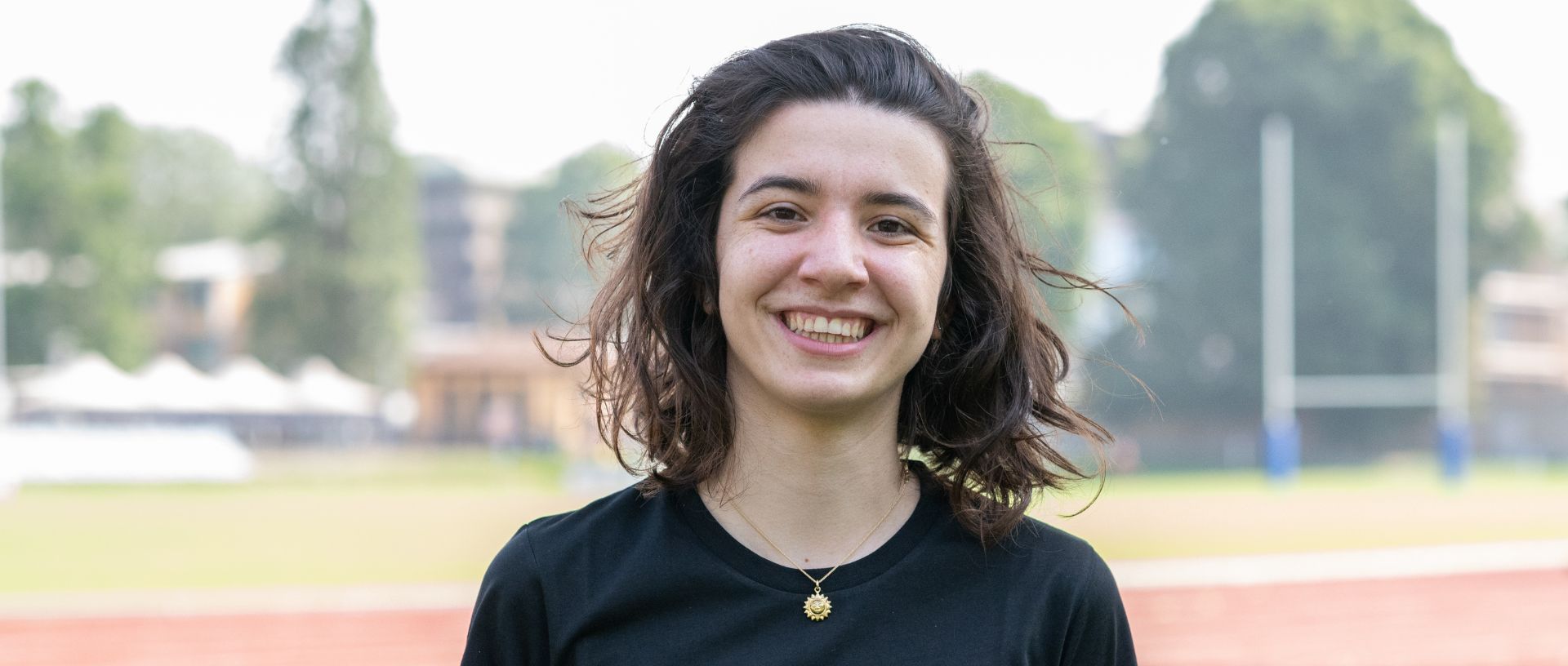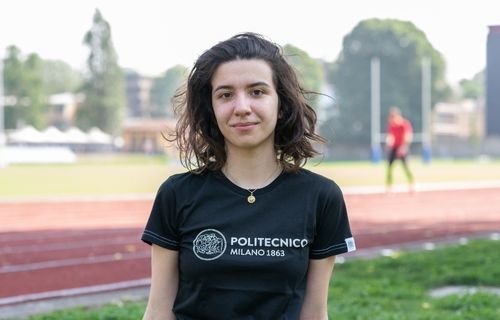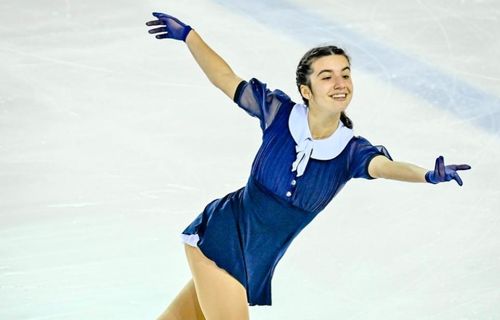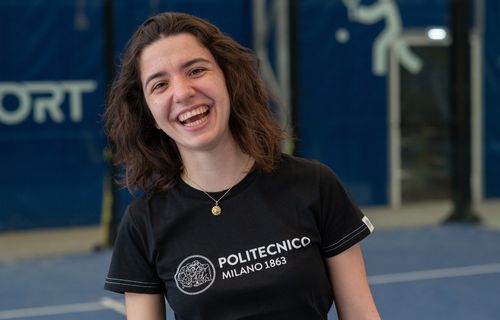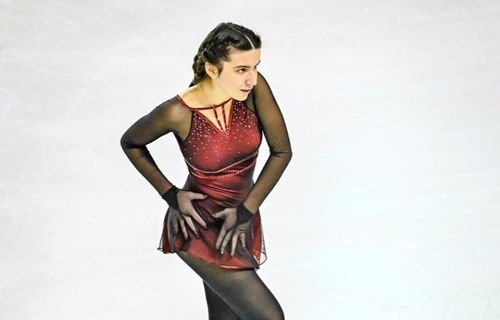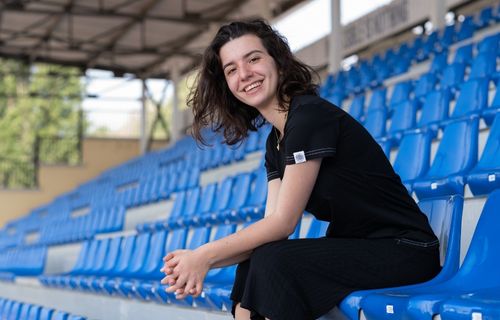Atleti Polimi – Veronica Testoni
Interview with the figure-skater and Biomedical Engineering student at the Politecnico di Milano
The star of this episode of "Polimi Athletes" is figure-skater Veronica Testoni. Veronica was born in Como. She is 20 years old and studies Biomedical Engineering at our university. In this interview she tells us about her life and passions. In her specialty of ice-skating, athletes perform movements of figures, steps, spins and jumps to a musical base.
Ciao Veronica! How did your love of figure skating begin?
My Mom, Auntie and Grandma had me in skates even before putting me in a stroller: I started skating when I was only three years old!
And in skating, the competitive level starts at eight years old. It’s true I won a lot of competitions as a child, but if I had to say exactly when, I think it was the summer after my twelfth birthday when I truly realised how much I enjoyed skating. During summer training that year I saw other girls my own age doing things that were harder than I could, but I said to myself: "If they can do it, so can I."
Since then I’ve put heart and soul and all my free time into it.
What figure-skaters or athletes inspire you?
Many skaters inspire me. I follow all the best ones and I really enjoy watching them in competitions, and in the workouts they post in their social media. I am a good observer and I concentrate on what strikes me about their performances.
Among my favourites: Anna Cappellini and Luca Lanotte, world dance champions in 2014; Valentina Marchei, five times overall Italian champion; and then a long list of Russian men and women skaters, like Alena Kostornaia, Evgenia Medvedeva, Daria Usacheva and many other first and and family names even of very young athletes …. all ending in "eva"!
For my long programs these last two seasons, we’ve used the same music as Cappellini-Lanotte, but “revisited” by my own choreographer Andrea Gilardi, a true maestro.
Which of the competitions you have participated in thrilled you the most?
The 2019 Sofia Trophy and 2019 Skate Victoria, both held in Sofia, Bulgaria, but also the national qualifying competition of 22February 2020, just before the pandemic. Those are definitely a couple of the competitions that I found the most exciting.
In February 2019, I was selected as a participant for the Sophia Trophy, an important Challenger Series competition: a big competition, full of emotion. But I managed to stay on top of my program, performing a triple loop in competition for the first time. That was an element that had worried me quite a bit, that I’d been rehearsing in training for quite a while. I placed seventh!
Two months later I was back in Sofia for Skate Victoria. I was recovering from an Italian championship where I’d gone in as one of the favourites, but failed to show my true abilities. So I was looking for redemption. In the second segment of competition I skated perfectly and managed a fourth place, just 13 hundredths from third: in terms of athletics that would be a difference of less than a thousandth of a second.
Finally, the latest thrill: last February 20, in the second segment of the championships, I did the most beautiful, fun, exciting short and free programs of my career. The scores were my personal best, and for a full four high-level technical elements, rewarded by the judges with excellent ratings: three double axels and a perfectly rotated triple salchow.
What do you think has been your greatest sporting success?
My greatest success isn’t the competition scores. Instead it’s been my ability to skate consistently and the achievement of both athletic and scholastic results throughout my high school years, graduating with excellent grades.
With my family, we never questioned the time necessary for my education, like so many athletes in my sport who leave at age 16 after compulsory education. The fact that I’ve continued training even in this first year of college, consistently and on a daily basis, makes me really proud of my personal path.
In between we had the pandemic that kept me away from skating for months, but skating also saved me at some times when everyone else was locked down at home. When athletes of national interest were given permission to train, that offered me a breath of hope.
What does sport mean to you? Do you think it has taught you something about other areas of life too?
To put it in engineering terms Veronica exists if, and only if, her skating exists!
But all kidding aside, skating has taught me to never give up and to always believe in myself. And to be patient. If you train steadily, deal with the frustration of failures, avoid getting side-tracked by opinions of others, then everything will happen in due time, maybe at different times than for others, but the results will come! It doesn't matter if a competition doesn't go well, if you don't pass an exam on first call: if you know that you’ve always trained well, if you know that you’ve always attended lectures, studied, and "broken the wall" with practice, you can be sure you’ll get good results in competitions and succeed in your courses.
In the world of sports I’ve also made solid, beautiful, lasting friendships: sports is what makes me who I am.
Why have you chosen to study Biomedical Engineering? Why at the Politecnico di Milano specifically?
I’m personally inclined to the sciences, but also I didn't want to completely leave the "human" part of science. In the end, biomedical engineering is the branch that also serves athletes.
And any choice other than Milan Polytechnic was never in question, because this is one of Italy’s best universities, and in the world. I’m lucky, because I live quite close. I also made the final decision because of friends who attended and knew about the Polytechnic. I started studying to pass the entry requirements in the second-last year of high school.
How do you manage to balance training and studying?
In small steps, day by day, I organise myself as best I can. In the morning I take classes and from lunch break through early afternoon I devote a couple of hours to training. In afternoon and evening: more classes, or studying. To be honest, recorded teaching sessions and on-line lectures are really useful for me, especially on days when I finish training late and can't get to the university on time. This way I don't miss any lectures.
During the semester I always try to keep up with the lectures and take advantage of my few free evening moments to reread and organise my notes, so that I arrive at the mid-term and final exams with most of the work already done.
How does the Dual Career programme help you with this?
The Dual Career programme immediately helped me feel part of a group, supported, not left on my own. Especially in second semester it was very helpful for me, because I had to train for the championship final: I managed not to miss a single lesson, thanks to the personal tutor and availability of online classes.
Are you satisfied with your choice of Politecnico di Milano? What advice would you give to an athlete who doesn't know whether or not to go to university?
Jump in, get enrolled! Sports and a university education are equally important. It will be harder, sure, but definitely worth it. Especially after the difficult years of Covid, when we lost some chances at competitive seasons, it's time to commit yourself 100 percent and make up for the years that got away a bit.
Do you find time for your private life too? What are your passions besides sport and studying?
Since I was little I’ve always loved to read: here and there on weekends, during travel, I still manage to pursue this passion.
I enjoy anime TV series, which, alas, I can’t follow over winter, so I catch up over summer!
During the couple of months when quarantine locked us out of the rink, I found that I enjoyed running but I had to shelve that once I returned to “normal” life, because of the lack of time. I would have liked to take part in the PolimiRun, but I’d need to be in shape, because I don't like to finish among the last!
For years now, I’ve kept up an Instagram page where I post my training session videos, so when I have a bit of free time I edit and organise the videos and photos for that. My page has one purpose: to convey the message that no one is too "old" to skate, and that skating, even though it may not seem this way, is a sport for everyone.
What do you like about Milan?
The public transport system. My family life is in a town just outside Como, but there we’re poorly connected with the city. So for me, a girl who started training alone in Milan on a daily basis at age 15, public transport fulfils a dream of independence. I love the ease of moving from one part of the city to another without having to plan everything in advance. I also really like being able to find all the stores in one place, the city full of cultural events and life.
What are your goals and dreams for the future, sporting and otherwise?
Finish my bachelor's degree soon and well, without too much effort (!), then choose a master's programme in the clinical engineering area. But I’ve still got time to decide!
And then complete my training to become a coach, and in the future a competition judge (or specialist), because I don't want to leave skating completely, even though I’ll need to stop competitive skating. Plus I have a small secret dream, to revolutionise the organisation of Italian skating, which at the moment I find obsolete and tied to old systems.
The Dual Career programme helps our students who practise sport at the highest level to pursue both their sporting and educational activities with confidence and success. Find out more!


